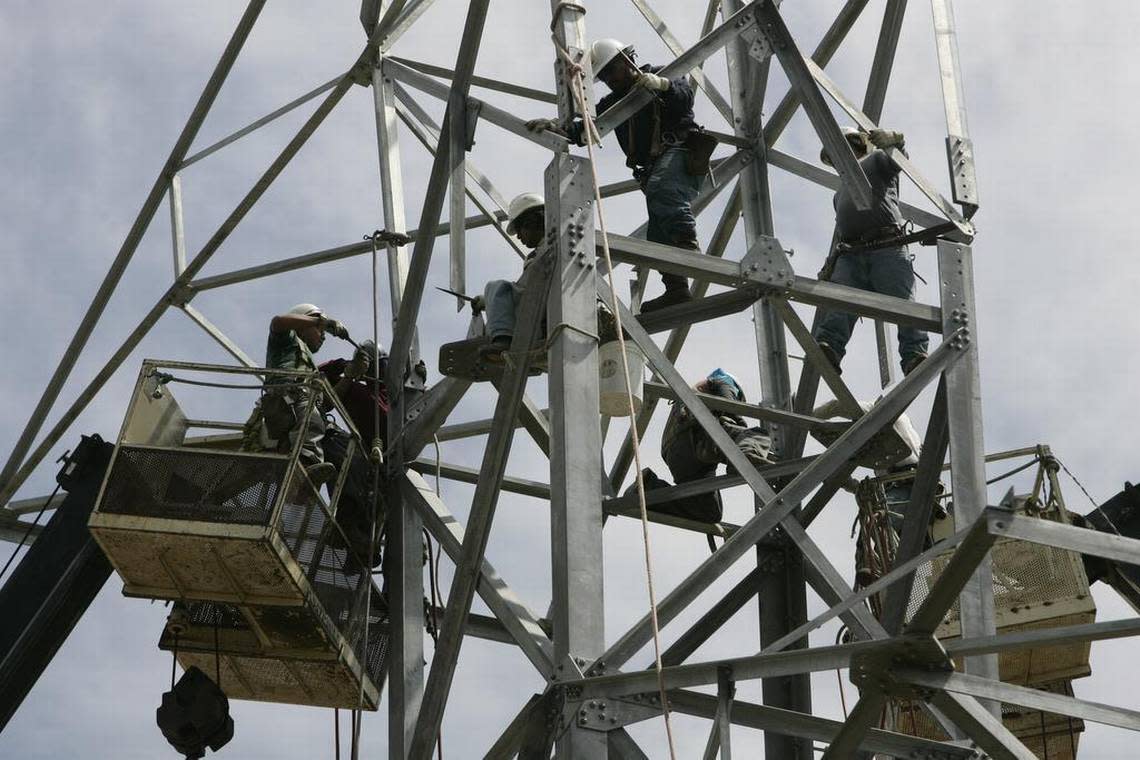Are power outages becoming the norm in Texas? Here’s what one study says
Texas had the second-most power outages in the country over the past 20 years, after California, according to a recent study from Texas-based electricity provider Payless Power. There were 82 power outages reported in Texas in 2022, and 1,565 in the past decade.
Payless Power collected and analyzed data on reported energy incidents and disturbances from 2002 to 2022. Texas had the most people impacted by power outages in 2022, the report found. The Lone Star State also accounted for 14% of the nation’s total power outages in 2022.
“Texas has been impacted by weather-related power disturbances significantly over the years,” Payless Power spokesperson Merritt Ryan told the Star-Telegram.
In February 2021, Texas experienced an energy crisis triggered by winter storms, leaving millions without power and hundreds dead. After the sweeping failure of the state’s power grid in 2021, the state is still scrambling to update its infrastructure to keep up with extreme weather. In May 2021, the Texas legislature moved to overhaul the state’s electric grid using measures like weatherization of power plants. Gov. Greg Abbott signed the bills that June.
Along with power issues, the state also experienced high power consumption in 2022. Texans were found to consume the sixth highest megawatts per capita in the country. They consumed 135.1 megawatts per capita, as of 2020, according to Payless Power.
There are a number of things that can cause disruptions to power. In 2022, the most common types of power disturbances were systems operations, transmission interruptions and severe weather, according to the electric company.
In the winter months, the most common type of power outage is severe weather. Most recently, over 78,700 Texas homes were without power because of an Arctic freeze that swept through the U.S. between Dec. 22-23. Over the last 20 years, Texas experienced 659% more outages in the winter than the rest of the country. Texas, California and Pennsylvania were the states most affected by power outages during the winter, the study found.
The Electric Reliability Council of Texas says it will have enough electricity for the winter, having instituted protocols for weatherization and inspections of electric generators and transmission facilities. ERCOT has promised to better communicate with the public and has told operators to adhere to maintenance schedules.
“Providing Texans with a reliable electric grid is our highest priority. As we monitor weather conditions, we want to assure Texans that the grid is resilient and reliable,” said Pablo Vegas, ERCOT President and CEO, when freezing weather came to Texas in December.

What Texans should know about power outages
ERCOT recommends conserving power when possible, especially during extremely cold or hot months. Payless Power says Texans should adjust their thermostats to accommodate extreme weather, while also ensuring that windows and doors are well-sealed. The best way to try to prevent power outages is to unplug or turn off things that are not in use.
“Being prepared is critical,” Ryan says. “People should keep an eye on the weather and adjust accordingly.”
Here’s what to do before, during and after a potential power outage occurs, according to the electric company spokesperson.
Before
Before the potential outage occurs, people should stock up on things they will need if the power goes out such as food, water and non-perishable items.
Getting a backup generator is a great idea if it is within your budget.
One of the most important steps you can take before an outage is to pay attention to updates as they happen. Whether it’s through the news or energy providers, knowing what could potentially happen will help you prepare.
During
During the power outage, unplug everything that is not in use. Those items, including TVs, computers, medical devices and more, could be damaged when the power surges back on.
Keep refrigerators and freezers closed as much as possible to conserve the food inside.
Stay off your phone as much as possible to conserve the battery.
If you run out of water, check to see if there is a boil alert before drinking the water from the faucet.
Never try to heat your home with a gas stove or oven.
After
After an outage, check around your property to see if there is any damage.
If there are items that need to be fixed, plan out who you will call for help.
Plug in the appliances and electronics that were unplugged one at a time, so the electrical system isn’t overloaded.
Check out your refrigerator and freezer in case food went bad and needs to be discarded.
Use what you learned from the experience. Was there something you wish you had done but didn’t? Make that a priority when preparing for a potential power outage in the future.
